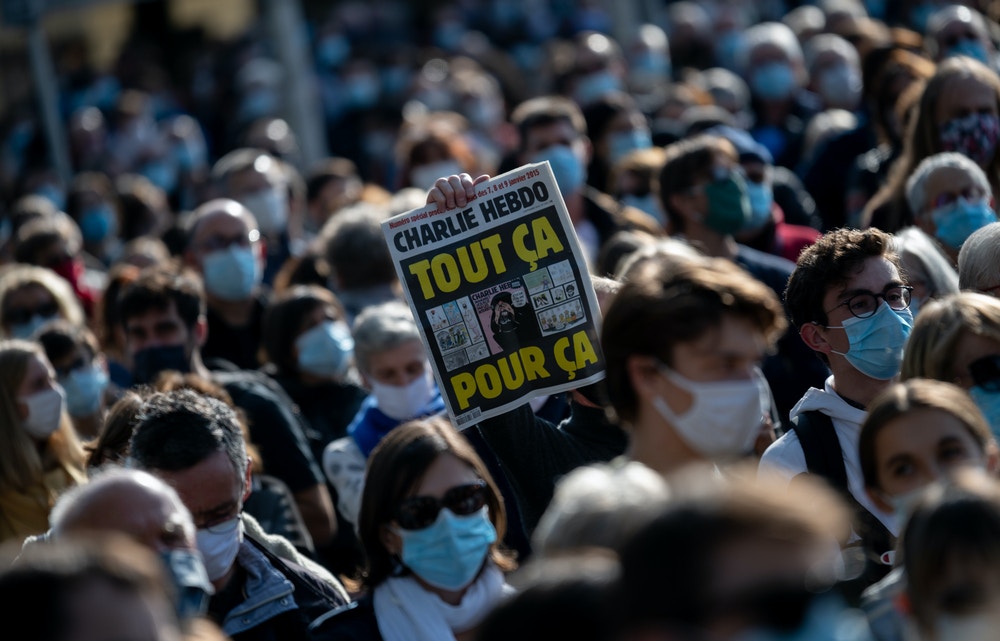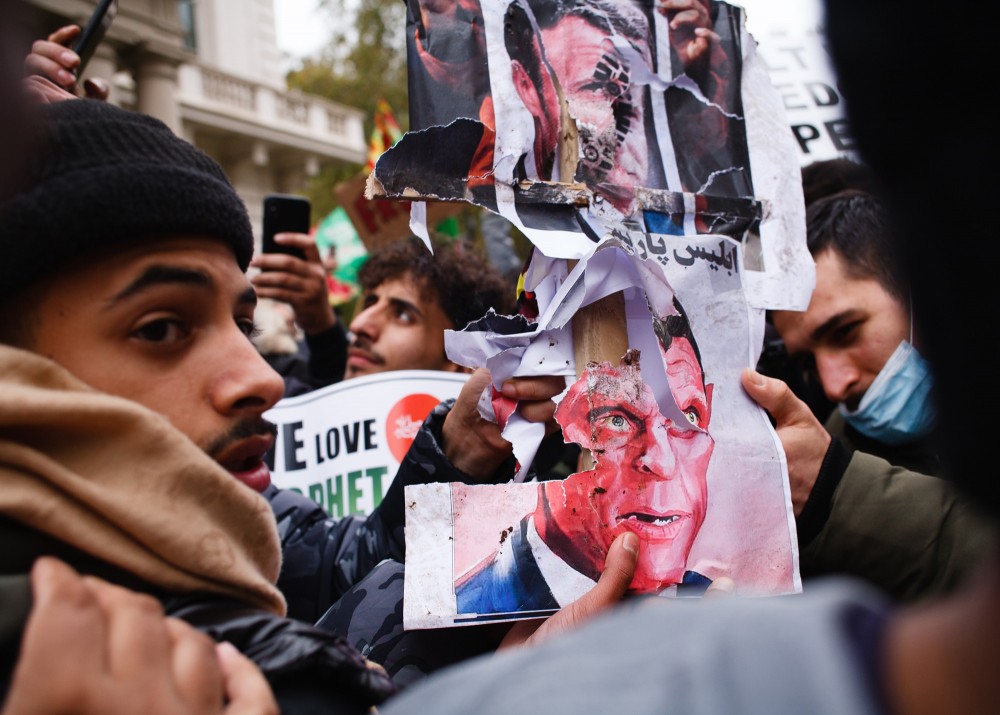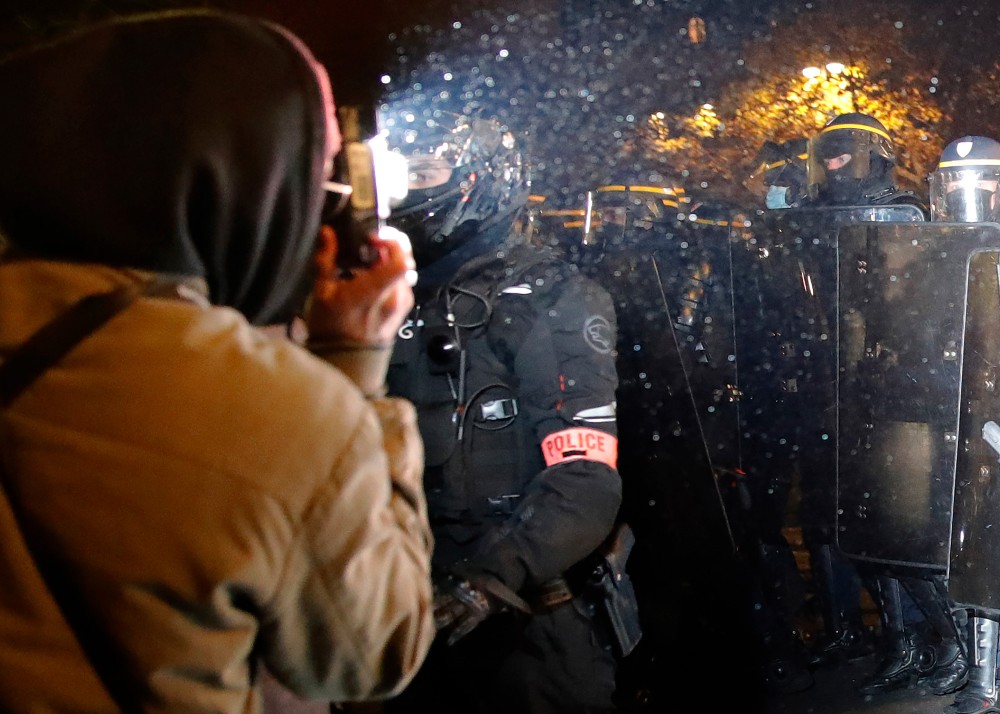In recent years, French President Emmanuel Macron was best known internationally for being the target of bright yellow-vested protesters, thousands of whom took to the streets for months to vent anger at domestic misgovernance. Lately, though, Macron has become more famous for something else: taking up the banner of the clash of civilizations.
With France on edge owing to a slew of terror attacks, most recently a pair of gruesome killings within a few days of each other in mid-October, Macron has arguably fanned, rather than quelled, the flames of unrest. His highly touted response to the growing tensions in France over its Muslim population — the largest in Europe — and the terror threat seems less about directly stopping terrorist attacks than turning a security issue into a culture war, as well as galvanizing support for France’s growing geopolitical rivalry with Turkey.
“They need to find a political scapegoat. For them, that would be the Muslim community.”
“There are human rights issues and an issue of racism in France, and at the same time there is a terrorist threat in France. We can’t oppose one to the other,” said Marwan Muhammad, the former director of the Collective Against Islamophobia in France, a civil rights organization focused on discrimination against French Muslims. “The government has been consistently failing to address the terrorist threat from the standpoint of security and criminality. When they fail on that front, they need to find a political scapegoat. For them, that would be the Muslim community.”
Macron’s decision to make fighting Islamism and reviving the glory days of European empire has been popular with some Europeans looking for assertive leadership. But it risks doing something else: turning a manageable domestic security problem with terrorism that France faces into an unwieldy, grand project. It’s unclear that Macron can actually carry out his mission successfully — which may very well do more harm than good.
Photo: Pascal Guyot/AFP/Getty Images
The latest turn began in mid-October, not long after Macron’s high-profile sojourn to France’s former Lebanese protectorate. After returning, Macron delivered a provocative speech about the crisis of Islam that quickly went viral around the world. In short order, events seemed to conspire to underline his point. All of Europe, not just France, was jarred by the beheading of a history teacher, Samuel Paty, by an 18-year-old Chechen refugee angered over rumors that Paty had displayed disparaging images of the Prophet Mohammed to his class. Days later, an extremist went on a stabbing rampage in the southern city of Nice, killing three people in a church.
In the wake of national tragedy, a level of sympathy and solidarity should be expected. But following the attacks, the global response very quickly moved to criticizing France. This was at least in part due to disastrous public relations by the French government, which responded to the attacks by projecting the cartoons on public buildings, arresting four 10-year-old children, and launching an indiscriminate crackdown on French Muslim political organizations that had nothing to do with the killings. Protests and calls to boycott French products spread around the world, while the initial context of the killings was drowned out in a tidal wave of anger and mutual incomprehension.
Within a few weeks Macron himself was calling up the New York Times to complain about perceived bias in American news coverage, claiming that an alleged over-focus on racism in French society by the media was “legitimizing” violence. An article on the Financial Times website that had irked Macron was pulled down after he submitted a letter of complaint, while a similar article about French secularism in Politico was terminated after editors post-facto decided it didn’t meet editorial standards.
The irony of Macron’s campaign to suppress speech critical of his government has not escaped notice. “Racism and double standards cannot be challenged by caving in to those who wish to restrict speech or the right to blaspheme,” wrote Guardian columnist Kenan Malik in a pointed column remarking on Macron’s ironic censorship campaign. “Nor can free speech be bolstered, or terrorism contained, by ignoring double standards, racist bigotry and the illiberalism of much of Macron’s policies.”
The debate was in line with a growing international discourse about free speech and integration, but it failed to address the root problems that gave rise to terrorism in France.
Few would argue that France doesn’t face a serious terrorist threat. Since 2015, hundreds of French citizens, including many French Muslims, have been killed in extremist attacks linked to groups like Al Qaeda and the Islamic State. Macron’s reaction, seemingly assigning collective blame for the atrocities, has suggested that France’s sloganeering about liberty would not extend to its Muslim population, including the vast majority who have been equally horrified by the attacks as the rest of their compatriots.
A more targeted approach focusing on problems in France — treating it as an organized crime problem rather than a sectarian conflict with half the planet and the global media — might also would yield more obvious results.
Take France’s Fiche S, or “S File,” security watchlist. The French government has thousands of individuals on security watchlists, such as Fiche S, which track extremists, including many alleged Islamic radicals. Many people have found themselves on this list for spurious reasons and had their lives disrupted as a result.
These injustices aside, the list also fails from a security standpoint: The criteria for inclusion on such lists is often so broad that it becomes ineffective as a tool for finding actual terrorists. Rather than finding individuals prone to violence, particularly people with criminal histories like French terrorists often have, the government approach has inclined toward viewing piety as a precursor to violence.
“There are too many false positives in part because the government idea of radicalization is too extensive,” said Muhammad, of the Collective Against Islamophobia. “If having a beard or attending prayers is considered a sign of radicalization, resources are going to be wasted surveilling a lot of ordinary Muslims while missing a lot of gangsters and criminals.”

Photo: Estelle Ruiz/NurPhoto/Getty Images
Then there is the fiery rhetoric. In addition to Macron’s own recent statements, some of which he has sought to clarify or backtrack from, his voluble Interior Minister Gérald Darmanin has generated alarm about what is actually happening in France. Not long ago, Darmanin was best known for facing serious for sexual assault allegations. Now he has become better known for his provocative comments about French Muslims. He has expressed shock over seeing religiously certified food stocked in grocery stores and mainstreamed far-right terminology to describe sections of society as descending into savagery. The interior minister has also stated that the government has been carrying out raids on individuals and groups unrelated to the attacks to “send a message.”
This sort of indiscriminate tough talk may resonate with the ideological far-right and even some ordinary people reeling in the aftermath of collective trauma, but it’s also contributed to the same global media backlash that has so irritated Macron. In the white-hot atmosphere following the attacks, his own disastrous government messaging encouraged even more extreme rumors about the country. A proposal to extend ID numbers to all French school children as a means of tracking attendance was misinterpreted internationally as a plan to spy on French Muslim children, an unhelpful misconception shared by social media users that quickly spread around the world.
“The horrific comments from the government regarding French Muslims, and the ensuing debates, led to this unfortunate confusion.”
“The whole affair was interpreted as: The French Government is going to assign an ID number to Muslim students to track them — which is absolutely untrue,” said Rim-Sarah Alouane, a French legal scholar and Ph.D. candidate in comparative law at University Toulouse 1 Capitole. “On a legal level this would never pass. Data on religion, race or ethnicity in France are strictly illegal, with some very regulated exceptions for academic research. But the horrific comments from the government regarding French Muslims, and the ensuing debates, led to this unfortunate confusion.”
Several actions already taken by the French government have been extreme enough without the need for embellishment. In recent weeks, the government moved to liquidate many French Muslim civil society organizations and charities, including the Collective Against Islamophobia in France, an effectively secular political group created to fight discrimination. In response to government threats, the collective announced that it had relocated its operations out of the country.
At the same time, the government began taking steps to create a state-approved French Muslim civil society under its control. Given Macron’s apparent sensitivity to criticism, it’s unlikely that these new organizations will be empowered to provide substantive feedback to government policy like the Collective Against Islamophobia and others have done.


Left/Top: Demonstrators opposing the publication in France of cartoons of the Prophet Mohammad set fire to images depicting French President Emmanuel Macron during a protest outside the French Embassy in London on Oct. 30, 2020. Right/Bottom: A demonstrator takes a picture of police officers during a protest against the bill on police images in Paris on Nov. 21, 2020.Photo: David Cliff/NurPhoto/Getty Images; Christophe Ena/AP
Macron has become a stereotypically polarizing figure across Europe and around the world. On one hand, he’s been demonized as a racist chauvinist at war with a helpless minority. On the other, he is being celebrated as a warrior against political correctness, unafraid to call out the real problems in society and who is allegedly causing them — in this case, poorly integrated French Muslims and their “Islamic separatism.” Amid all this, Macron has also been in the news almost constantly with abortive plans to reconstitute the French empire in the Middle East and revive the era of great European civilization.
As is often the case, the more you narrow the aperture, the more complex things start to appear. While Macron is clearly interested in taking strong positions on the great issues of world history, there are also the more prosaic, perhaps boring, questions of administering the economic, political, and security needs of the country. On those counts, Macron has appeared less inspiring.
“It baffles me that right now almost no one is talking about what the intelligence services were doing before this attack and why they didn’t catch the assailant beforehand.”
Before he rebranded as a global warrior of the Enlightenment against religious obscurantism, Macron’s biggest problem was dealing with a long-running protest movement triggered by a proposal to raise gas taxes. Even before the recent terrorist attacks — which, at the end of the day, his security agencies failed to prevent — Macron’s pivot to culture war over Islam seemed curiously timed for a country reeling from a public health and economic crisis triggered by the Covid-19 pandemic.
When the French government proposed a new security law that would restrict the filming of police officers, people poured into the street. In the wake of this outrage, Macron appears to be walking back the effort. On his efforts to shutter nongovernmental Muslim groups and legislate official ones, though, Macron is pressing forward with his plan — and an uprising does not seem to be in the offing. That the two would-be related efforts are linked, but garner drastically different responses, is not lost on everyone. And few see any hope for dealing with the security situation through a civil society crackdown on French Muslims or a grand project of religious reformation.
Macron is now pushing ahead with what he calls a “draft law to strengthen republican values,” following a global outcry over his comments about Islamic separatism. Some of the measures aim at outlawing common cultural practices among some conservative Muslims that are generally unpopular in France. Experts, though, say that such measures focusing on culture over security are unlikely to stop attacks like the ones that hit the country this fall.
“It baffles me that right now almost no one is talking about what the intelligence services were doing before this attack and why they didn’t catch the assailant beforehand,” said Francesco Ragazzi, an expert on counterterrorism and associate professor in international relations at Leiden University in the Netherlands, commenting on the terrorist attacks and the government response. “We still need to see what kind of law comes out of the parliamentary process in the end, but my sense is that the new measures are unlikely to prevent terrorism.”
This post was originally published on Radio Free.